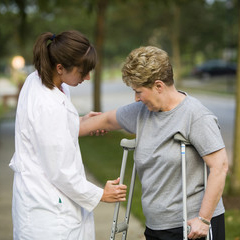Physical Therapy
Independent Mobility & Injury Prevention
Reduce Fall Risk
Reducing fall risk is a primary concern for our residents. Muscle weakness, limited mobility, and foot pain all increase risk for falls, and physical therapy can target each of these issues. Physical therapists focus on improving balance, strengthening muscles in the lower extremities, and reducing pain to prevent falls.

Build Strength
Building muscle strength can help reduce fall risk and is also beneficial in granting residents more independence. Physical therapists guide residents through safe and effective exercises to achieve their desired outcomes, such as easily lifting groceries, holding children, and moving around living spaces.

Target Pain
Chronic pain can lead to reduced mobility, depression, and sleep problems. Physical therapists work with you to restore movement and help your body heal by targeting the issues behind pain, which is critical for improving quality of life. Physical therapists also educate residents on ways to minimize pain in the future.


